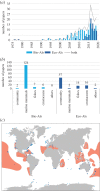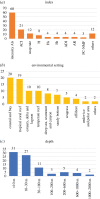Acoustic indexes for marine biodiversity trends and ecosystem health
- PMID: 33131437
- PMCID: PMC7662202
- DOI: 10.1098/rstb.2019.0447
Acoustic indexes for marine biodiversity trends and ecosystem health
Abstract
Acoustic approaches have been recently proposed to investigate critical ecological issues, such as biodiversity loss and different typologies of impacts, including climate change. However, the extensive use of acoustic monitoring is hampered by the lack of algorithms enabling the discrimination among different sound sources (e.g. geophysical, anthropogenic and biological). Eco- and bioacoustic indexes have been applied to provide non-invasive information on the temporal and spatial patterns of marine biodiversity and on the anthropogenic impact on marine life. Here, we review the potential of acoustic tools in expanding the monitoring of marine ecosystems from a current three-dimensional perception to a four-dimensional dimension. We also explore the use of acoustic indexes, mostly developed in terrestrial ecology, for the investigation of different marine ecosystems. Their appraisal, strengths and limits, and potential for future investigations in the biological exploration of the oceans are also discussed. This article is part of the theme issue 'Integrative research perspectives on marine conservation'.
Keywords: acoustic indexes; ecoacoustics; ecosystem health; marine biodiversity; soundscape ecology.
Conflict of interest statement
We declare we have no competing interests.
Figures


References
-
- Küpper FC, Kamenos NA. 2018. The future of marine biodiversity and marine ecosystem functioning in UK coastal and territorial waters (including UK Overseas Territories) – with an emphasis on marine macrophyte communities. Bot. Mar. 61, 521–535. (10.1515/bot-2018-0076) - DOI
-
- Luypaert T, Hagan JG, McCarthy ML, Poti M. 2020. Status of marine biodiversity in the Anthropocene. In YOUMARES 9 - The oceans: Our research, Our future: proceedings of the 2018 conference for YOUng MArine RESearcher in oldenburg, Germany (eds Jungblut S, Liebich V, Bode-Dalby M), pp. 57–82. Cham, Switzerland: Springer International Publishing.
-
- Danovaro R, et al. 2016. Implementing and innovating marine monitoring approaches for assessing marine environmental status. Front. Mar. Sci. 3, 213 (10.3389/fmars.2016.00213) - DOI
-
- Costello MJ, et al. 2017. Methods for the study of marine biodiversity. In The GEO handbook on biodiversity observation networks (eds Walters M, Scholes RJ), pp. 129–163. Cham, Switzerland: Springer International Publishing.
Publication types
MeSH terms
LinkOut - more resources
Full Text Sources
